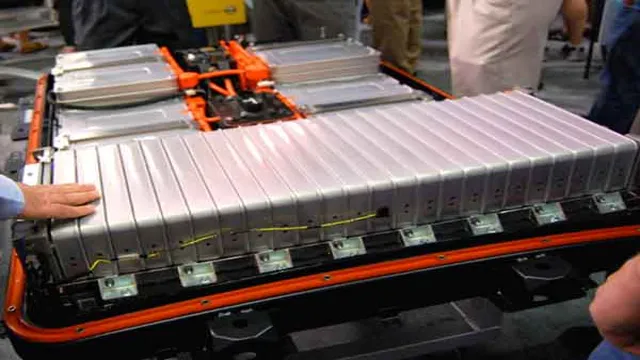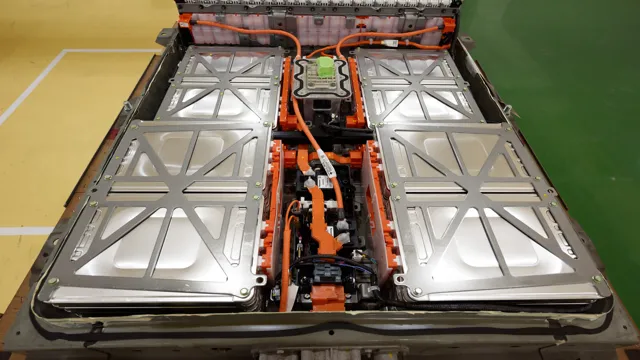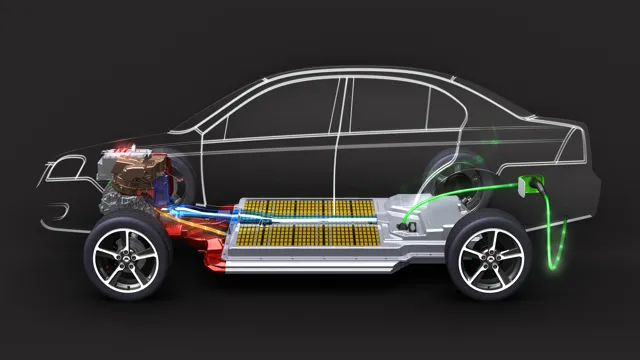Revolutionizing the Electric Car Industry: Exploring the Power of High-Density Battery Technology
Have you ever wondered how electric car batteries impact their range? Well, battery density is the answer. Battery density basically refers to how much energy a battery can store in a given space. Since electric cars run on battery power alone, it makes sense that battery density would play a significant role in determining how far an electric vehicle can travel.
The higher the density of the battery, the more energy it can store, and consequently, the longer your EV’s range. This is because high-density batteries can pack more energy into a smaller and lighter package. On the other hand, low-density batteries can’t store as much energy, leading to a shorter range.
Battery density is a critical factor not only for the range of the EV but also for the weight of the car and the cost of the battery. A higher density battery means a lighter vehicle, which in turn translates to energy efficiency and a longer range. Also, a battery with higher density tends to be more expensive due to the advanced materials and manufacturing processes required.
Electric vehicle manufacturers around the world continue to explore new battery technologies in pursuit of higher battery densities. The ultimate goal is to produce batteries that can store more energy in a smaller and lighter package, thus extending the range of EVs and paving the way for a sustainable future. So, next time you’re considering an electric vehicle, remember that battery density plays a crucial role in determining how far it can go on a single charge.
The higher the battery density, the longer the range of the EV.
What is Battery Density?
Battery density refers to the amount of energy that can be stored in a battery per unit of volume or mass. When it comes to electric cars, battery density is an essential factor as it can determine the vehicle’s driving range and overall efficiency. In other words, a higher battery density allows the car to travel further on a single charge, and it also means that the battery can be smaller and lighter while still providing the same amount of power.
This is why researchers are continuously working on developing batteries with higher density as it is crucial to making electric cars more competitive and appealing to consumers. With the demand for electric vehicles on the rise, it is essential to finding new and advanced ways to increase battery density while keeping costs reasonable.
The Definition and Importance to Electric Cars
Battery density plays an essential role in the electric car industry as it directly impacts its performance, range, and charging time. It refers to the amount of energy a battery can store per unit of volume or mass. The higher the battery density, the longer the car can travel and the faster it can charge.
Therefore, improving battery density has always been a priority for electric car manufacturers. Lithium-ion batteries are the most commonly used in electric cars due to their high energy density, but there are ongoing efforts to enhance them. Researchers are focusing on developing solid-state batteries that can provide even higher energy density while being safer and more durable.
By improving battery density, we can accelerate the transition to cleaner and more sustainable transportation, reduce carbon emission, and ultimately, save the planet.

Factors Affecting Battery Density
Electric car battery density can be affected by several factors, including the type of materials used and their chemical properties. For instance, lithium-ion batteries, which are commonly used in electric cars, have a higher energy density than lead-acid batteries due to their ability to store more energy in the same amount of space. Additionally, battery design plays a significant role in density.
Batteries with smaller electrode spacing have higher densities, as more electrodes can be fitted into the same space. Another factor that affects density is temperature. Lower temperatures result in lower density, while higher temperatures result in higher density.
Finally, battery age also affects density. As batteries age, they lose capacity, which results in a decrease in density. Understanding these factors and how they affect density is critical in developing more efficient and longer-lasting battery technologies for electric cars.
Chemical Composition, Temperature, and Other Factors
Battery density can be affected by various factors such as chemical composition, temperature, and other external factors. The chemical composition of a battery is one of the most important factors that contributes to its density. The materials used in the production of the electrodes, separators, and electrolytes play a vital role in determining the battery’s density.
For instance, lithium-ion batteries are known to have a higher energy density compared to lead-acid batteries. Additionally, the temperature of the battery can also influence its density. As the temperature increases, the battery’s capacity decreases due to an increase in internal resistance.
Other factors such as the type of charger used to charge the battery, age of the battery, and the number of charge cycles it has gone through can also affect its density. It’s important to take note of these factors to ensure that your battery performs optimally and to maximize its lifespan.
Comparing Battery Types
When it comes to electric car battery density, there are a few different types of batteries to compare. Lithium-ion batteries are by far the most common type of battery used in electric cars due to their high energy density and relatively low cost. However, newer battery technologies such as solid-state batteries and lithium-sulfur batteries are showing promise in terms of even higher energy densities.
Solid-state batteries, for example, have the potential for double the energy density of lithium-ion batteries, which would greatly increase the range of electric cars. While these newer battery types are still in the early stages of development, it’s exciting to see the potential for even better electric car performance in the future.
Lithium-Ion, Nickel-Metal Hydride, and Other Options
When it comes to batteries, there are multiple options available in the market, each with its own set of advantages and disadvantages. Lithium-ion batteries are the most popular choice due to their higher energy density, longer lifespan, and lower self-discharge rate. However, they are also more expensive and can be potentially hazardous if not handled properly.
In contrast, nickel-metal hydride batteries are more affordable and environmentally friendly but have a lower energy density and shorter lifespan. Other options, such as lead-acid and alkaline batteries, exist as well, but they are less commonly used in modern devices due to their bulkiness and lower efficiency. Ultimately, the choice of battery type depends on the specific application and budget, with factors such as capacity, charging time, and safety being crucial considerations.
Therefore, it is always wise to research and compare different battery options before making a final decision, ensuring that you pick the best one that suits your needs and requirements.
Pros and Cons of Each Type for Electric Cars
When it comes to electric cars, the battery type plays a crucial role in determining their performance and efficiency. Two common types of batteries used in electric cars are Lithium-ion (Li-ion) batteries and Nickel-metal hydride (NiMH) batteries. Li-ion batteries are widely used in modern electric cars due to their high energy density and fast charging capabilities.
However, they are expensive to produce and have a limited lifespan. On the other hand, NiMH batteries are cheaper to manufacture and have a longer lifespan. However, they are bulkier and have a lower energy density, which affects the car’s range.
Ultimately, the choice of battery type depends on the car’s intended use and budget. For those looking for high performance and quick charging times, Li-ion batteries may be the better option. However, for those seeking a cheaper and more durable battery, NiMH is the way to go.
The Future of Electric Car Batteries
The future of electric car batteries is constantly evolving, with advances in technology making them more efficient and practical. One area of focus is electric car battery density, which relates to how much energy can be stored in a given space within the battery. As battery density increases, electric cars can travel further on a single charge, making them more convenient and practical for daily use.
Researchers are exploring many new approaches to improve battery density, such as using new materials, nanostructures, and advanced manufacturing techniques. As battery technology continues to advance, we can expect further improvements in electric car batteries that will transform the way we travel.
Technologies and Innovations Advancing Battery Density
As electric vehicles become more mainstream, the demand for batteries with higher energy density continues to grow. Fortunately, there are various technologies and innovations currently being developed to increase battery density and make electric cars more efficient. Lithium-air batteries, for instance, are being researched due to their potential to store significantly more energy than traditional lithium-ion batteries.
Similarly, solid-state batteries are gaining attention for their ability to have higher energy density and faster charging times than current lithium-ion batteries. Furthermore, advancements in silicon anodes and graphene batteries could allow for increased energy storage and longer battery life. It’s clear that the future of electric car batteries is bright, with a wide range of options currently under development to keep them running longer and more efficiently.
Implications for Range and Charging Times
The future of electric car batteries is promising, with many advancements in technology that could dramatically improve the range and charging times of electric vehicles. One major development is the use of solid-state batteries, which have the potential to provide much higher energy density than the current lithium-ion batteries. This means that electric cars could soon have equivalent ranges to gasoline cars, making them more practical for long distance travel.
Additionally, many companies are working on faster charging solutions, such as ultra-fast chargers that could fully charge a battery in just a few minutes. These developments could make electric cars more appealing to consumers who are hesitant to switch due to range anxiety and long charging times. As the technology continues to improve, we may see a future where electric cars are the norm and gasoline-powered vehicles are a thing of the past.
Conclusion
In conclusion, when it comes to electric car battery density, we want to see things charged up! With higher battery density comes longer driving distances and a brighter energy future. It’s time to power up and embrace the electrifying potential of electric vehicles. Let’s hit the road with a jolt of excitement!”
FAQs
What is electric car battery density?
Electric car battery density refers to the amount of energy that can be stored in a given volume or weight of battery. It is measured in watt-hours per liter (Wh/L) or watt-hours per kilogram (Wh/kg).
How does battery density affect an electric car’s range?
Battery density directly affects an electric car’s range, as higher battery density allows for more energy storage in a smaller space or weight. This means that a car with a higher battery density can travel further on a single charge than one with a lower battery density.
What are some factors that can affect electric car battery density?
Some factors that can affect electric car battery density include the type of materials used in the battery, the battery’s design, the temperature at which it operates, and the charging and discharging methods used.
Are there any advancements in electric car battery density?
Yes, there have been many advancements in electric car battery density in recent years. Researchers are exploring new materials, such as solid-state batteries, that have the potential to significantly increase battery density and improve overall battery performance.





